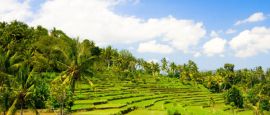Indonesia History, Language and Culture
History of Indonesia
The discovery of the remains of 'Java Man' suggests that Indonesia was inhabited by early humans as early as 1.5 million years ago, but little evidence remains of early tribal civilisations. In the 7th century, Indonesia fell under the influence of the Srivijaya kingdom, bringing Hinduism and Buddhism to the islands for the first time.
Islam arrived in the 13th century, and Java and Sumatra became powerful sultanates, while other islands continued to follow Hindu, Buddhist and Animist traditions. The Portuguese were the first Europeans to settle in Indonesia in 1512, establishing trade posts for valuable spices such as nutmeg and cloves. Dutch and British traders followed in their footsteps.
A century later in 1602, the Dutch established the Dutch East India Company (VOC), took over major trade routes and eventually established colonial rule over the archipelago.
The start of the 20th century saw the beginnings of an Indonesian independence movement known as Sarekat Islam, which gained huge popularity, despite suppression from the Dutch colonial regime. The Japanese invasion in WWII lead to the withdrawal of the Dutch, but some four million Indonesians died as a result of the occupation.
The subsequent surrender of Japan at the end of the war lead the then-president Sukarno to pronounce Indonesia's independence on 17 August 1945, but democracy was quickly replaced by an increasingly authoritarian regime with power residing ultimately with the president and a series of appointed councils. To unify this disjointed collection of kingdoms and sultanates, the Sukarno regime launched a massive propaganda campaign based on concepts of national heroes and national identity.
In 1965, General Suharto seized control in a military coup and brutally suppressed opposition in a reign lasting until 1998. The independent islands of West Irian and East Timor were annexed, and farmers from Muslim majority islands were strategically settled on other islands.
Eventually, opposition to Suharto's rule reached a critical level during the East Asian Financial Crisis. Suharto was forced to step down in 1998 and was replaced by B. J. Habibie. The presidents that followed included Abdurrahman Wahid, Megawati Sukarnoputri, Susilo Bambang Yudhoyono and Joko Widodo.
Indonesia has faced a few major earthquakes in recent years and the country has managed to rebuild and continue to attract tourists to the archipelago.
Did you know?
• There are more than 150 volcanoes in Indonesia, and 127 of them are still active.
• Indonesia is the most populous Muslim nation in the world.
• The National Institute of Aeronautics and Space said Indonesia has 18,307 islands according to its survey, but other surveys show different figures, so no one really knows exactly how many islands they are in Indonesia.
Language in Indonesia
Bahasa Indonesia is the official national language of Indonesia. Altogether, there are an estimated 700 indigenous languages and dialects spoken in the archipelago. Most formal education, administration, media and other forms of communication are conducted in Indonesia. English is widely spoken in tourist areas.




 You know where
You know where